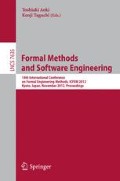Abstract
With the demand for new and complicated features, embedded systems are becoming more and more difficult to design and verify. Even if the design of a system is verified, how to guarantee the consistency between the design and its implementation remains a big issue. As a solution, we propose a framework that can help a system designer to model his or her embedded system using a high-level modeling language, verify the design of the system, and automatically generate executable software codes whose behavior semantics are consistent with that of the high-level model. We use two case studies to demonstrate the effectiveness of our framework.
This work is mainly supported by TRF Project “Research and Development in the Formal Verification of System Design and Implementation” from Temasek Lab@National University of Singapore; partially supported by project IDG31100105/IDD11100102 from Singapore University of Technology and Design, and project MOE2009-T2-1-072 from School of Computing@National University of Singapore.
Access this chapter
Tax calculation will be finalised at checkout
Purchases are for personal use only
Preview
Unable to display preview. Download preview PDF.
References
Amnell, T., Fersman, L., Mokrushin, E., Petterson, P., Yi, W.: TIMES: A Tool for Schedulability Analysis and Code Generation of Real-Time Systems. In: Larsen, K.G., Niebert, P. (eds.) FORMATS 2003. LNCS, vol. 2791, pp. 60–72. Springer, Heidelberg (2004)
Clarke, E.M., Grumberg, O., Peled, D.A.: Model Checking. MIT Press (1999)
Heitmeyer, C., Kirby, J., Labaw, B., Bharadwaj, R.: SCR*: A Toolset for Specifying and Analyzing Software Requirements. In: Vardi, M.Y. (ed.) CAV 1998. LNCS, vol. 1427, pp. 526–531. Springer, Heidelberg (1998)
Hsiung, P.A., Lin, S.W.: Automatic synthesis and verification of real-time embedded software for mobile and ubiquitous systems. Computer Languages, Systems & Structures 34(4), 153–169 (2008)
Hsiung, P.-A., Lin, S.-W., Hung, C.-C., Fu, J.-M., Lin, C.-S., Chiang, C.-C., Chiang, K.-C., Lu, C.-H., Lu, P.-H.: Real-Time Embedded Software Design for Mobile and Ubiquitous Systems. In: Kuo, T.-W., Sha, E., Guo, M., Yang, L.T., Shao, Z. (eds.) EUC 2007. LNCS, vol. 4808, pp. 718–729. Springer, Heidelberg (2007)
Hsiung, P.A., Lin, S.W., Tseng, C.H., Lee, T.Y., Fu, J.M., See, W.B.: VERTAF: An application framework for the design and verification of embedded real-time software. IEEE Transactions on Software Engineering 30(10), 656–674 (2004)
Knapp, A., Merz, S., Rauh, C.: Model Checking - Timed UML State Machines and Collaborations. In: Damm, W., Olderog, E.-R. (eds.) FTRTFT 2002. LNCS, vol. 2469, pp. 395–414. Springer, Heidelberg (2002)
Lin, S.W.: https://sites.google.com/site/shangweilin/pat-codegen
Liu, Y., Sun, J., Dong, J.S.: Developing Model Checkers Using PAT. In: Bouajjani, A., Chin, W.-N. (eds.) ATVA 2010. LNCS, vol. 6252, pp. 371–377. Springer, Heidelberg (2010)
Méry, D., Singh, N.K.: Automatic code generation from event-B models. In: SoICT 2011, pp. 179–188 (2011)
Niz, D., Rajkumar, R.: Time Weaver: A software-through-models framework for embedded real-time systems. In: LCTES, pp. 133–143 (2003)
Peterson, G.L.: Myths about the mutual exclusion problem. Information Processing Letters 10(3), 115–116 (1981)
Ramkarthik, S., Zhang, C.: Generating java skeletal code with design contracts from specifications in a subset of object Z. In: ACIS-ICIS 2006, pp. 405–411 (2006)
Samek, M.: Practical UML Statecharts in C/C++: Event-Driven Programming for Embedded Systems. Newnes (2008)
SCADE, http://www.esterel-technologies.com/products/scade-suite/
Sun, J., Liu, Y., Dong, J.S., Chen, C.: Integrating specification and programs for system modeling and verification. In: TASE 2009, vol. 962, pp. 127–135 (2009)
Thompson, J.M., Heimdahl, M.P.E., Miller, S.P.: Specification-based prototyping for embedded systems. In: SIGSOFT 1999, pp. 163–179 (1999)
Author information
Authors and Affiliations
Editor information
Editors and Affiliations
Rights and permissions
Copyright information
© 2012 Springer-Verlag Berlin Heidelberg
About this paper
Cite this paper
Lin, SW., Liu, Y., Hsiung, PA., Sun, J., Dong, J.S. (2012). Automatic Generation of Provably Correct Embedded Systems. In: Aoki, T., Taguchi, K. (eds) Formal Methods and Software Engineering. ICFEM 2012. Lecture Notes in Computer Science, vol 7635. Springer, Berlin, Heidelberg. https://doi.org/10.1007/978-3-642-34281-3_17
Download citation
DOI: https://doi.org/10.1007/978-3-642-34281-3_17
Publisher Name: Springer, Berlin, Heidelberg
Print ISBN: 978-3-642-34280-6
Online ISBN: 978-3-642-34281-3
eBook Packages: Computer ScienceComputer Science (R0)

